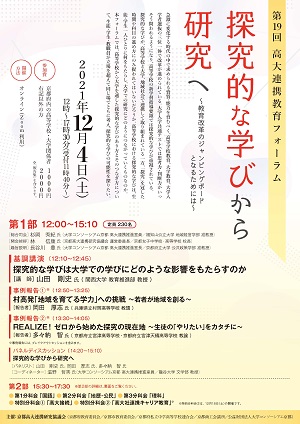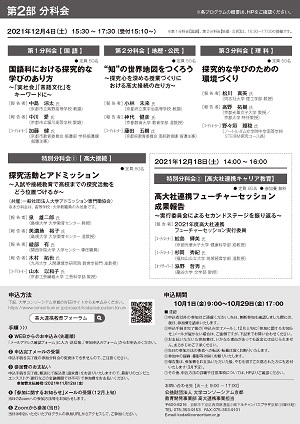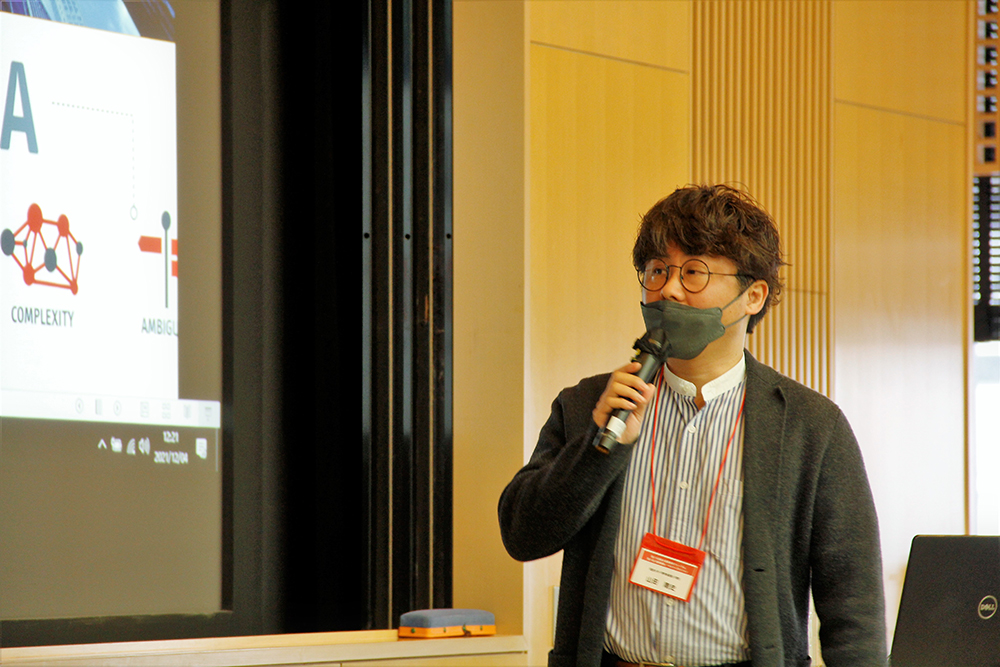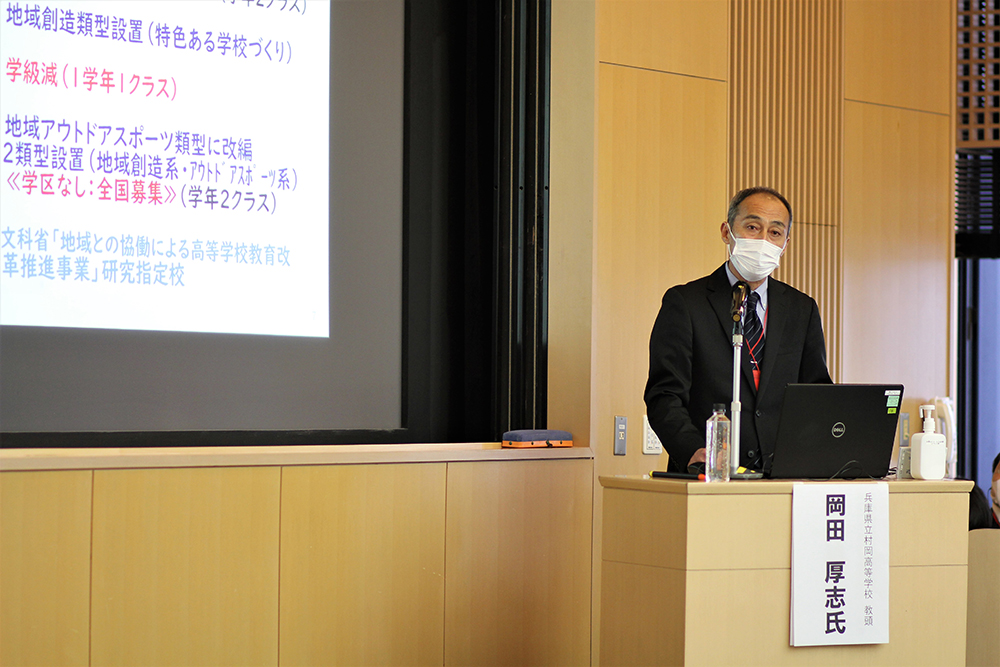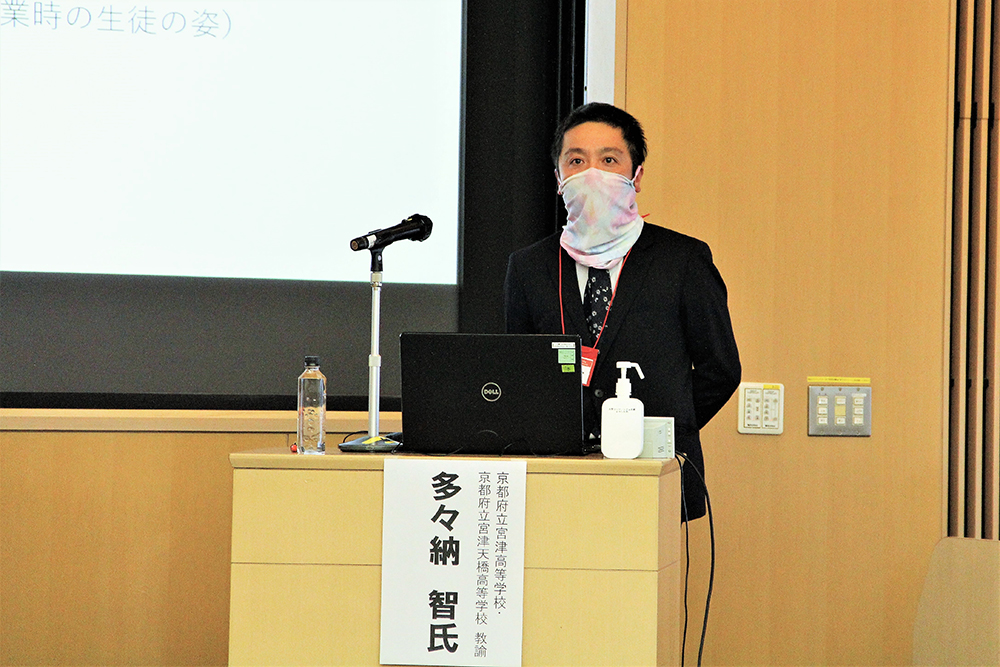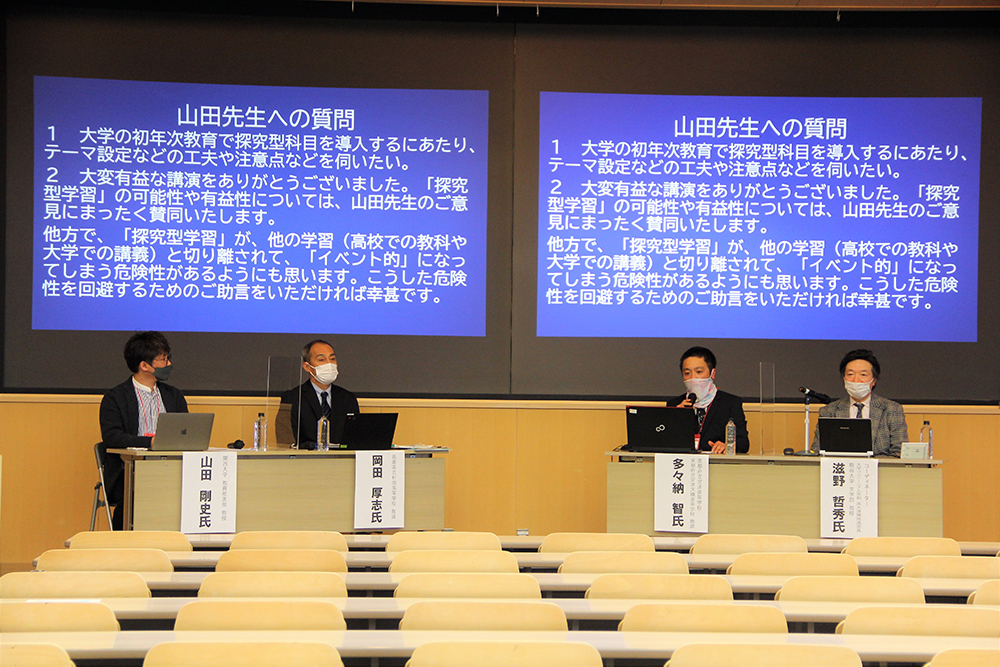Business Overview
The forum is held for the purpose of “sharing information on domestic trends and disseminating information on initiatives in Kyoto” in the issue of collaboration and connection education between high schools and universities.
Outline of the event
The 19th Forum on Collaborative Education between High School and University
* About the system error that occurred on Friday, October 1
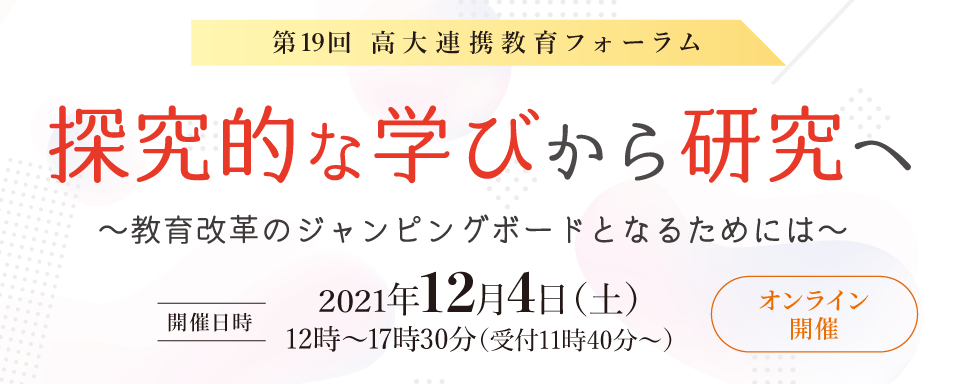
In order to cultivate the qualities and abilities required in this rapidly changing era, reforms are being carried out in the trinity of high school education, university education, and university entrance examination. The Common Test for University Entrance Examinations has become even more demanding on thinking and judgment, and the new course of study for high schools emphasizes inquiry-based learning.
While inquiry-based learning is being undertaken in collaboration with high schools, universities, and local communities, are we not confined only to the time and the way courses are conducted with the word “inquiry”? What does exploratory learning in high school bring to each student and how does it lead to research at university?
In this forum, we would like to explore the possibilities of exploratory learning by allowing students, students, faculty and staff to think together in the same place regardless of their positions and how to connect them from high school to university.
* In response to the recent spread of the new coronavirus infection, the Kyoto High School University Collaborative Research Council is promoting efforts to prevent the spread of infection. In the future, from the perspective of preventing the spread of infection, we may take measures to change or cancel the implementation of this forum. In that case, we will inform you on this website. Thank you for your understanding.
| Date: | Saturday, December 4, 2021 | ||
| Venue | Online (via Zoom) | ||
| theme | From Exploratory Learning to Research ―To become a jumping board for educational reform― |
||
| Capacity (First-come, first-served basis) |
Part 1: | Keynote speech, case report (1), case report (2), panel discussion | 230 people |
| Part 2 | , Subcommittee 1 [Japanese] | 50 people | |
| Subcommittee 2 [Geography and Civics] | 50 members | ||
| Subcommittee 3 [Science] | 50 people | ||
| Special Subcommittee (1) [High School and University Connection] * 80 high school and university faculty members only |
. | ||
| Special Subcommittee (2) [Career Education in Collaboration with High School and University] *Held separately on Saturday, December 18 |
90 * Increased number of employees |
||
| Participation Fee | High schools and universities in Kyoto Prefecture Those other than the above * Includes “Report Collection”. |
JPY 1,000 JPY 2,000 |
|
| Organizer: | Kyoto High School-University Collaborative Research Council (Kyoto Prefectural Board of Education, Kyoto City Board of Education, Kyoto Prefectural Federation of Private Junior and Senior High Schools, Kyoto Chamber of Commerce and Industry, University Consortium Kyoto) | ||
The flyer for the 19th High School-University Collaborative Education Forum can be downloaded here.
【Part 1】12:00~15:10 Keynote Speech, Case Report (1), Case Report (2), Panel Discussion
General Chairperson
Mr. Hideki Sugioka (Member, High School-University Collaboration Promotion Office, University Consortium Kyoto / Associate Professor, Faculty of Regional Management, Fukuchiyama Public University)
Opening Remarks
Mr. Nobuyasu Hayashi (Chairperson, Kyoto High School-University Collaborative Research Council / Principal, Kyoto Girls’ Junior and Senior High School)
Explanation of purpose
Yutaka Hasegawa (Director, Office for the Promotion of High School-University Collaboration, University Consortium Kyoto / Associate Professor, Faculty of Public Policy, Kyoto Prefectural University)
| Keynote Speeches 12:10~12:45 |
How does inquiry-based learning affect university learning?
|
|
| In a social situation that is called an unpredictable era, society is looking for school education to cultivate the ability to identify and solve problems and the agency to work toward them. At universities, there are increasing opportunities for exploratory learning such as graduation research and thesis, PBL (Problem/Project Based Learning), and service learning. In this context, how are changes in high school education, especially the exploratory learning experience, affecting learning at university? I would like to explore this theme with data. | ||
| 12:45~12:50 | Break | |
| Case Report (1)* 12:50~13:25 |
The challenge of “academic ability to nurture the community” from Murataka ~Young people create communities~
|
|
| At our school, the main aim is to develop “academic ability to nurture the community,” which means “academic ability to live and work in daily life” and “academic ability with independence and a desire to live.” Through the process of practically solving regional issues in collaboration with governments, universities, local educational institutions, and local residents (the process of community development), we aim to cultivate “academic ability to nurture the community,” embody the qualities and abilities to collaborate and participate in regional revitalization, and to develop future-oriented individuals who love “the region” and acquire the “academic ability to nurture the community.” | ||
| 13:25~13:30 | Break | |
| Case Report (2)* 13:30~14:05 |
REALIZE! Where is the current state of the quest that started from scratch? ~Giving shape to students’ “what they want to do”~
|
|
| With the aim of becoming aware of social issues and realizing independent career development, our school introduced inquiry activities for all students in regular courses from the 2018 academic year. The project team formed before the introduction of the system visited other schools and researched teaching materials, and through training sessions, all faculty and staff members were on the same page. In 2015, he founded the Field Exploration Club (now the Department) and has created a role model for regional exploration. The results of this research are returned to the time of comprehensive inquiry, and we aim to pursue exploration with a rich regional flavor while emphasizing interests. | ||
| 14:05~14:20 | Break | |
| panel discussion 14:20~15:10 |
From Exploratory Learning to Research
Mr |
|
*Case reports include breakout sessions.
【Part 2】15:30~17:30 Breakout Session
*The first session [Japanese language] and the second session [Geography and Civics] will be held from 15:30~17:00.
| Session 1 [Japanese] |
Inquiry-based learning in the Japanese language department ~With the keywords “real world” and “language and culture”~
|
|
| In order to achieve the goals of the Japanese Language Department in the new Course of Study, such as the ability to develop the “national language necessary for lifelong social life” and the development of qualities and abilities that enable students to become “bearers of the language and culture of Japan,” we will consider the future of learning based on the class practice reports from high schools, and exchange ideas on how to connect this to learning at university. | ||
| Session 2 【History/Civics】 |
Let’s create a world map of “knowledge” ~How to connect high school and university in creating classes that deepen the spirit of inquiry~
|
|
| As part of Kyoto University of Education’s “Global Studies,” we report on the practice of high school ethics classes created from a new perspective by high school and university faculty members in collaboration with each other, centered on the exploration of values in the age of globalization. Through these reports, we will consider the ideal form of classroom practice and inquiry activities that lead from high school exploration to university research. * Mr. Jindai’s report will be distributed by recording. |
||
| Subcommittee 3 [Science] |
Creating an environment for inquiry-based learning
|
|
| How can we nurture and extend interest in the field of science through inquiry-based learning for female students? Notre Dame Jogakuin Junior and Senior High School will report on the practice of the inquiry course, and from the university’s point of view, Doshisha University and Kyoto Koka Women’s University, which are participating in the Japan Science and Technology Agency’s “Science Career Selection Support Program for Female Junior and Senior High School Students,” will report on the project. | ||
| Special Breakout Session (1) 【High School and University Connection】 |
Exploration and Admissions ~How to position inquiry activities up to high school in entrance examinations and connection education~ (Co-organizer: Association of University Admissions Professionals)
|
|
| We will report on how the experience of inquiry activities up to high school leads to the impact of high school students on their university entrance examination activities, their treatment in entrance examinations, and their learning status after enrollment. Next, we will discuss with the participants the impact of inquiry activities in high school on examination behavior and the entrance examination system, and share future possibilities and challenges. *This subcommittee is only for high school and university faculty and staff. |
||
Saturday, December 18, 2021 14:00~16:00 *Free of charge
| Special Breakout Session (2) 【Collaboration between high school and university】 Career Education] |
Report on the results of the Future Session ~Looking back on the second stage by the Executive Committee~
|
|
| Amid major changes in values and social conditions due to the impact of the new coronavirus infection, the diversity of ways of learning, working, and living is expanding. Based on this, we planned and created this year’s high school-university collaboration future session in the form of an executive committee composed of high school and university students, as we did last year. This subcommittee will report on the results of the second stage of the Executive Committee. * The “Future Session” is a career education program for high school-university collaboration that aims to develop the careers of high school and university students, and to engage in future-oriented dialogue and exchange across generations and schools. |
||
Application
The online application period has ended.
For inquiries regarding participation, please contact the High School-University Collaborative Education Forum
Please contact us at (E-mail:kodai@consortium.or.jp/TEL:075-353-9153).
Step 1
Please register your e-mail address from the “Apply” button below.
Step 2
Please access the URL of the “Application Form” sent to your registered email address, enter it according to the instructions on the screen, and receive the “Application Completion Email”.
Step 3
Please pay the participation fee at a convenience store by Friday, November 12, 2021 using the payment slip (invoice) that will be mailed to you.
* In principle, we do not issue receipts. If you need a receipt, please contact us at the address below.
Step 4
In early December, you will receive a “Notice of Participation” sent to your registered email address. We will inform you of how to participate in Zoom on the day of the event.
Step 5
On the day of the forum, please access the registration program participation URL described in the email “Notice of Participation” and participate in Zoom.
*To participate in the breakout session, please bring your camera and microphone.
Application period: Friday, October 1, 2021 9:00 a.m. ~ Friday, October 29, 2021 5:00 p.m.
【Precautions (please be sure to check)】
(1) If you do not receive the “Application Completion Email” or “Notice of Participation” email, please contact the following.
(2) The paid participation fee will not be refunded for any reason. Thank you for your understanding.
(3) We will not be able to respond to applications on the day of the event or changes to the participating subcommittees.
(4) It is strictly prohibited to forward or reprint the received e-mail to others.
(5) Except for proxy participation, participation fees other than the applicant will be charged at a later date.
* If you do not set cookies in your browser to “Enabled”, you may not be able to apply.
Implementation Report
▶ The 19th High School-University Collaborative Education Forum Report [Click here for details]
This year’s event was held under the overall theme of “From Inquiry-based Learning to Research: How to Become a Jumping Board for Educational Reform.” Continuing from last year, from the viewpoint of preventing the spread of new coronavirus infections, the event was held online using Zoom, but 144 people from all over the country participated.
In the keynote speech of the first part, Professor Takeshi Yamada, Professor of the Department of Education Promotion, Kansai University, gave a lecture titled “How does inquiry-based learning affect learning at university?” Next, as case reports, Mr. Atsushi Okada, Vice Principal of Hyogo Prefectural Muraoka High School, and Mr. Satoshi Tatano, a teacher at Kyoto Prefectural Miyazu High School and Kyoto Prefectural Miyazu Amabashi High School, reported on their own cases based on their own cases.
In the panel discussion, under the theme of “From Exploratory Learning to Research,” the speakers answered questions from the participants in response to the keynote speeches and case reports, and discussed the ideas of both high schools and universities.
In the second part of the subcommittee, in addition to the three subjects of “Japanese language,” “history and civics,” and “science,” four subcommittees were held this time, including “high school-university connection” as a special subcommittee (1), and examples of initiatives and reports were shared for each theme.
In addition, on Saturday, December 18, “High School-University Collaborative Career Education” was held as a special subcommittee (2), and it was held as a report meeting and review meeting for the results of the Executive Committee of the Council’s career education program “Future Session for High School-University Collaboration.” Participants were able to get a sense of the growth and learning of students through group work and question-and-answer sessions by high school and university executive committee members, and it was also an opportunity to think about new perspectives for high school-university connections.
Inquiries
Kyoto High School-University Collaborative Research Council Secretariat
(University Consortium Kyoto, Educational Development Division, High School-University Collaboration Project)
TEL 075-353-9153 FAX 075-353-9101
〒600-8216 Shimogyo-ku, Kyoto-shi, Nishitoin-dori, Shiokoji, Shimo-ku, Kyoto, Campus Plaza Kyoto
* Reception hours: Tuesday ~ Saturday 9:00 ~ 17:00 (excluding year-end and New Year holidays)














